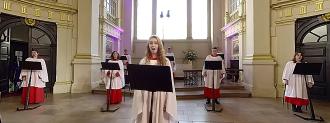To help social-distancing parishioners get the full Christmas experience, the Church of England is releasing performances of advent carols in virtual reality — and it’s not just people trying to avoid COVID-19 who are benefitting.
The challenge: About 50% of the U.K. population identifies as Christian, and while most don’t attend church regularly, if they are going to go, it’s going to be in the runup to Christmas, when the birth of Jesus is celebrated with pageants and the singing of advent carols.
Part of the appeal of attending church is the feeling of being in a church, surrounded by fellow believers.
The pandemic is making it hard to keep up this tradition, though.
While there are no legal restrictions on attendance at churches in the U.K. this year (unlike 2020), some people won’t be comfortable in crowds right now, especially if they’re at high risk of COVID-19.
Virtually Christmas: To ensure congregants don’t miss out on the Christmas experience, many houses of worship have taken to livestreaming services.
But part of the appeal of attending church is the feeling of being in a church, surrounded by fellow believers.
To better recreate that experience this holiday season, the Church of England is releasing performances of advent carols in VR.
The details: St. Martin’s Voices, a professional ensemble based out of London’s St Martin-in-the-Fields church, sings the carols under the direction of Andrew Earis.
The performances were recorded and uploaded to YouTube as 360-degree videos, meaning anyone with access to an internet browser can listen to the singers and visually explore the space around them.
If you watch the performances with a VR headset, though, you feel like you’re standing right in front of the singers. You can turn your head to look around the historic church, and look up to take in its decorative ceiling.
Beyond the pandemic: While the pandemic spurred the recent surge in online offerings from churches, it’s not just people at high risk of COVID-19 who are benefitting from them — those who have trouble attending in-person services due to disabilities are, too.
“Worship so often involves going to a building at a set time on a set day, sitting in a certain way with certain people,” Charlotte Cheshire, a vicar in the Church of England, told BBC News.
“I certainly hope that as many ministers and churches as possible will continue to do this.”
Charlotte Cheshire
That can be hard for Cheshire’s 11-year-old son Adam, who has learning difficulties and several health issues, including autism and asthma. Adam is a huge fan of advent carols, though, so Cheshire is grateful that he’s been able to enjoy the VR performances.
“Obviously I’m not the only one who finds it difficult to access a church building,” she said. “I certainly hope that as many ministers and churches as possible will continue to do this … as I think it’s essential for inclusion.”
We’d love to hear from you! If you have a comment about this article or if you have a tip for a future Freethink story, please email us at [email protected].






